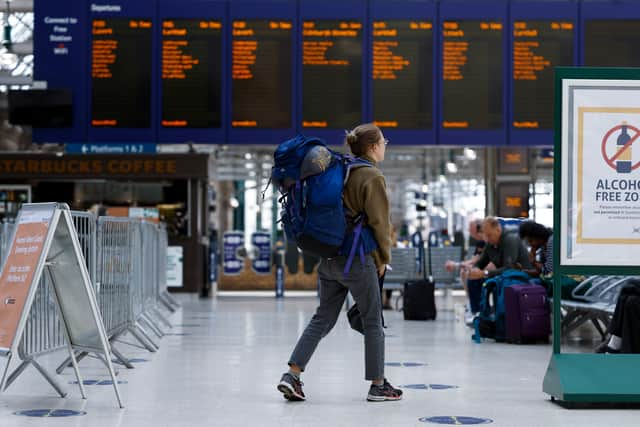October rail strikes 2022 dates: when is RMT train strike, who is striking, routes, what’s been said?
and live on Freeview channel 276
Fresh rail strikes will take place next month, a union has announced.
The Rail, Maritime and Transport union (RMT) announced that 40,000 of its members at Network Rail and 15 train operators will walk out on 8 October.
Advertisement
Hide AdAdvertisement
Hide AdRail strikes are already planned on 1 and 5 October, threatening fresh travel chaos for passengers next month.
Here is all you need to know:
When are the next RMT strikes?
The strikes will take place on Saturday 8 October.
It will affect 15 train companies across the country.
More than 40,000 RMT members will go on strike on 8 October.
RMT had previous announced strikes on Saturday 1 October as well.


Which train lines will be affected by the strikes?
The following lines will be impacted by the strikes:
- Chiltern Railways
- Cross Country Trains
- Greater Anglia
- LNER
- East Midlands Railway
- c2c
- Great Western Railway
- Northern Trains
- South Eastern South Western
- RailwayTranspennine Express
- Avanti West Coast
- West Midlands Trains GTR (including Gatwick Express)
What have RMT said about the strikes?
RMT general secretary Mick Lynch said it was encouraging that the new Transport Secretary Anne-Marie Trevelyan had met the union.
Advertisement
Hide AdAdvertisement
Hide Ad“We welcome this more positive approach from the government to engage with us as a first step to finding a suitable settlement.
“However, as no new offer has been tabled, our members have no choice but to continue this strike action.
“We will continue to negotiate in good faith, but the employers and government need to understand our industrial campaign will continue for as long as it takes,” he said.
Are other rail strikes planned in October?
Aslef announced this week that its members in 12 train operating companies will walk out on Saturday 1 October and Wednesday 5 October in a long-running dispute over pay.
Advertisement
Hide AdAdvertisement
Hide AdThe union said drivers will also strike at East Midlands Railway on 5 October after members voted for industrial action earlier this week.
Mick Whelan, Aslef’s general secretary, said: “We don’t want to go on strike – withdrawing your labour, although a fundamental human right, is always a last resort for this trade union – but the train companies have been determined to force our hand.
“They are telling train drivers to take a real terms pay cut. With inflation now running at 12.3% – and set, it is said, to go higher – these companies are saying that drivers should be prepared to work just as hard, for just as long, but for considerably less.
“The companies with whom we are in dispute have not offered us a penny. It is outrageous that they expect us to put up with a real terms pay cut for a third year in a row.”
Advertisement
Hide AdAdvertisement
Hide AdAslef members at 13 companies – Avanti West Coast; Chiltern Railways; CrossCountry; East Midlands Railway; Greater Anglia; Great Western Railway; Hull Trains; LNER; London Overground; Northern Trains; Southeastern; TransPennine Express; and West Midlands Trains – will strike on 1 and 5 October, while drivers at East Midlands Railway will walk out on 5 October.
A Rail Delivery Group spokesperson said: “These strikes will once again hugely inconvenience the very passengers the industry needs to support its recovery from the ongoing impact of the pandemic.
“They range from those left out of pocket because they can’t get to work, to people missing vital appointments and to thousands of London marathon participants, who, after months of training, will have their journeys to London disrupted at the weekend.
“The strikes are not in the long-term interests of rail workers or building a sustainable rail industry. We want to give our people a pay rise, but without the reforms we are proposing, we simply cannot deliver pay increases.
Advertisement
Hide AdAdvertisement
Hide Ad“Revenue is still around 80% of pre-pandemic levels; no business can survive that scale of upheaval without implementing change.
“The actions of union leaders have very real consequences: every strike day takes more money out of their members’ pockets.
“We want to see the industry and its people thrive – we are asking the unions’ leadership to do the right thing, call off these damaging strikes and work with us to make that happen.”
Comment Guidelines
National World encourages reader discussion on our stories. User feedback, insights and back-and-forth exchanges add a rich layer of context to reporting. Please review our Community Guidelines before commenting.